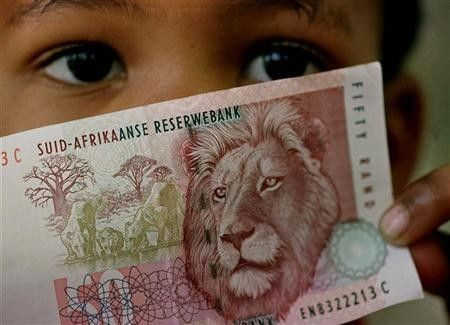S.Africa bonds edge up, rand volatile against dollar

South Africa's rand fell as much as 1.4 percent against the dollar on Thursday as a survey pointed to a decline in business confidence and in line with a weaker euro, before recouping those losses in volatile trade.
The business confidence index dipped for the second month in a row to 98.6 in August from 99.0 in July, the South African Chamber of Commerce and Industry said.
This is the latest in a raft of data backing the case for further monetary easing which would in theory lessen returns on rand-denominated assets.
Government bonds, hit by heavy foreign selling in recent weeks as investors sought safer havens, edged slightly higher but were unlikely to attempt the early September rally that pushed benchmark yields to all time lows.
The yield on four-year paper dipped two basis points to 6.81 percent and that for the 2026 bond closed just one basis point lower at 8.52 percent.
We're basically at the opening levels of this morning and that's where the market has closed. Today it was all about what came out of the European Central Bank and the Bank of England, WWC Securities head of bond trading Marten Banninga said.
The ECB announced new liquidity measures to support the struggling euro zone economy, but some analysts saw these as doing little to calm investor nerves which have led to a heavy pull-out from emerging assets traditionally seen as high risk.
Unfortunately the protection of own cash and balance sheet has become the main issue here, Banninga said.
People are not prepared to put on high amounts of risk and that has forced the selling of our bonds. The nervousness unfortunately will be with us until such time that we get a better indication where things are going.
The rand gyrated from highs to lows against the dollar throughout the session, touching its strongest level of the day at 7.8791 before swinging to 8.0850 at the other end.
The currency traded at 7.98 by 1611 GMT, just 0.13 percent softer than its New York close on Wednesday.
The business confidence data we had earlier didn't help the currency, but in all honesty local news is taking a back seat to what's happening globally at the moment, a rand trader in Johannesburg said.
© Copyright Thomson Reuters 2024. All rights reserved.





















